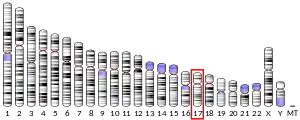| MIR4521 | |||||||||||||||||||||||||||||||||||||||||||||||||||
|---|---|---|---|---|---|---|---|---|---|---|---|---|---|---|---|---|---|---|---|---|---|---|---|---|---|---|---|---|---|---|---|---|---|---|---|---|---|---|---|---|---|---|---|---|---|---|---|---|---|---|---|
| Identifiers | |||||||||||||||||||||||||||||||||||||||||||||||||||
| Aliases | MIR4521, mir-4521, microRNA 4521 | ||||||||||||||||||||||||||||||||||||||||||||||||||
| External IDs | GeneCards: MIR4521 | ||||||||||||||||||||||||||||||||||||||||||||||||||
| |||||||||||||||||||||||||||||||||||||||||||||||||||
| |||||||||||||||||||||||||||||||||||||||||||||||||||
| |||||||||||||||||||||||||||||||||||||||||||||||||||
| Wikidata | |||||||||||||||||||||||||||||||||||||||||||||||||||
| |||||||||||||||||||||||||||||||||||||||||||||||||||
MicroRNA 4521 is a micro RNA that in humans is encoded by the MIR4521 gene. [3]
Function
microRNAs (miRNAs) are short (20-24 nt) non-coding RNAs that are involved in post-transcriptional regulation of gene expression in multicellular organisms by affecting both the stability and translation of mRNAs. miRNAs are transcribed by RNA polymerase II as part of capped and polyadenylated primary transcripts (pri-miRNAs) that can be either protein-coding or non-coding.
The primary transcript is cleaved by the Drosha ribonuclease III enzyme to produce an approximately 70-nt stem-loop precursor miRNA (pre-miRNA), which is further cleaved by the cytoplasmic Dicer ribonuclease to generate the mature miRNA and antisense miRNA star (miRNA*) products. The mature miRNA is incorporated into a RNA-induced silencing complex (RISC), which recognizes target mRNAs through imperfect base pairing with the miRNA and most commonly results in translational inhibition or destabilization of the target mRNA. The RefSeq represents the predicted microRNA stem-loop.
miR-4521 has been shown to have decreased expression in various cancers, including breast cancer and lung cancer. In gastric carcinoma, miR-4521 has been reported to inhibit EMT and metastasis.[4]
References
- 1 2 3 GRCh38: Ensembl release 89: ENSG00000283160 - Ensembl, May 2017
- ↑ "Human PubMed Reference:". National Center for Biotechnology Information, U.S. National Library of Medicine.
- ↑ "Entrez Gene: MicroRNA 4521". Retrieved 2016-03-08.
- ↑ Xing S, Tian Z, Zheng W, Yang W, Du N, Gu Y, et al. (January 2021). "Hypoxia downregulated miR-4521 suppresses gastric carcinoma progression through regulation of IGF2 and FOXM1". Molecular Cancer. 20 (1): 9. doi:10.1186/s12943-020-01295-2. PMC 7786912. PMID 33407516.
This article incorporates text from the United States National Library of Medicine, which is in the public domain.

